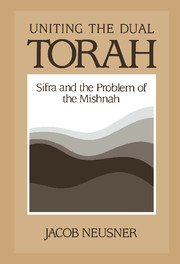Book contents
- Frontmatter
- Contents
- Preface
- Prologue
- 1 The Problem of the Mishnah
- 2 Torah as a Common Noun: The Solution of the Talmuds
- 3 A Sample of Sifra
- 4 From Common Noun to Proper Noun: Sifra's Re-presentation of the Two Torahs as One
- 5 Sifra's Alternative to the Mishnah's Topical Program and Its Order
- 6 Sifra's Alternative to the Mishnah's Logic of Cogent Discourse
- 7 Sifra's Alternative to the Mishnah's Proof of Propositions through Taxonomic Classification and Hierarchization
- 8 Re-presenting the Torah: Sifra's Rehabilitation of Taxonomic Logic
- 9 Torah as Proper Noun and the Structure of the Logic of Creation
- Appendix: The Distinctive Character of Sifra among Midrash Compilations
- Bibliography
- Index
1 - The Problem of the Mishnah
Published online by Cambridge University Press: 06 July 2010
- Frontmatter
- Contents
- Preface
- Prologue
- 1 The Problem of the Mishnah
- 2 Torah as a Common Noun: The Solution of the Talmuds
- 3 A Sample of Sifra
- 4 From Common Noun to Proper Noun: Sifra's Re-presentation of the Two Torahs as One
- 5 Sifra's Alternative to the Mishnah's Topical Program and Its Order
- 6 Sifra's Alternative to the Mishnah's Logic of Cogent Discourse
- 7 Sifra's Alternative to the Mishnah's Proof of Propositions through Taxonomic Classification and Hierarchization
- 8 Re-presenting the Torah: Sifra's Rehabilitation of Taxonomic Logic
- 9 Torah as Proper Noun and the Structure of the Logic of Creation
- Appendix: The Distinctive Character of Sifra among Midrash Compilations
- Bibliography
- Index
Summary
The Problem of the Mishnah
When, in ca. A.D. 200, the Mishnah reached closure and was received and adopted as law by the state-sanctioned Jewish governments in both the Roman empire, in the land of Israel, and Iran, in Babylonia, respectively, the function and character of the document precipitated a considerable crisis. Politically and theologically presented as the foundation for the everyday administration of the affairs of Jewry, the Mishnah ignored the politics of the sponsoring regimes. Essentially ahistorical, the code hardly identified as authoritative any known political institution, let alone the patriarchate in the land of Israel, the exilarchate in Babylonia. True, that political–institutional flaw (from the viewpoint of the sponsoring authorities) scarcely can have proved critical.
But silence of the authorship of the Mishnah on the theological call for their document presented not a chronic but an acute issue. Since Jews generally accepted the authority of Moses at Sinai, failure to claim for the document a clear and explicit relationship to the Torah of Moses defined that issue. Why should people accept as authoritative the rulings of this piece of writing? Omitting reference to a theological, as much as to a political myth, the authorship of the Mishnah also failed to signal the relationship between their document and Scripture. Since, for all Judaisms, Hebrew Scriptures in general, and the Pentateuch, in particular, represented God's will for Israel, silence on that matter provoked considerable response.
- Type
- Chapter
- Information
- Uniting the Dual TorahSifra and the Problem of the Mishnah, pp. 11 - 30Publisher: Cambridge University PressPrint publication year: 1990



